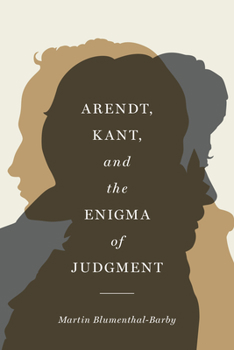Arendt, Kant, and the Enigma of Judgment
A nuanced extrapolation of Hannah Arendt's theory of judgment through her highly provocative reading of Immanuel Kant
More than a half century after it was first published, Hannah Arendt's Origins of Totalitarianism rose to the top of best-seller lists as readers grappled with the triumph of Trumpism. Arendt, Kant, and the Enigma of Judgment directs our attention to her later thought, the posthumously published and highly provocative Lectures on Kant's Political Philosophy. Martin Blumenthal-Barby puts this work in dialogue with Arendt's other writings, including her notes on Kant's Critique of Judgment, to outline her own theory of judgment for the twentieth century. In an era of post-truths and artificial intelligence, the idea that authentic judgment--for example, the ability to distinguish right from wrong--is incommensurable with abstract, automated processes lies at the center of Arendt's late work and at the fore of our collective reckoning. Rather than presenting us with a fixed account, Blumenthal-Barby suggests, Arendt's drawing and redrawing of conceptual distinctions is itself an enactment of judgment, a process that challenges and complicates what she says at every turn. In so doing, Arendt, in thoroughly Kantian fashion, establishes judgment as a performative category that can never be taught but only demonstrated. As sharp as it is timely, this incisive book reminds us why a shared reality matters in a time of intense political polarization and why the democratic project, vulnerable as it may appear today, crucially depends on it.Format:Paperback
Language:English
ISBN:0810145472
ISBN13:9780810145474
Release Date:October 2022
Publisher:Northwestern University Press
Length:168 Pages
Weight:0.52 lbs.
Dimensions:0.5" x 5.9" x 8.9"
Related Subjects
PhilosophyCustomer Reviews
0 rating





